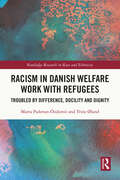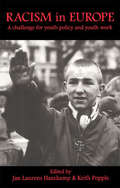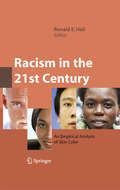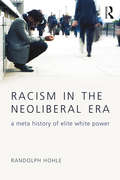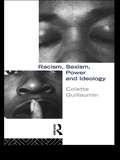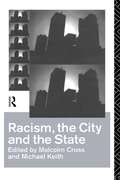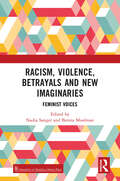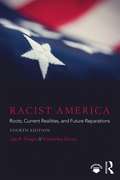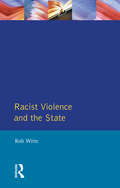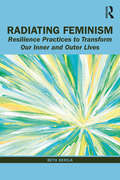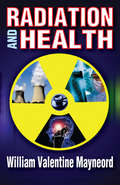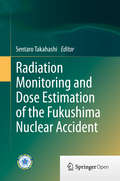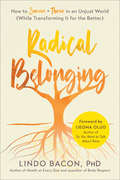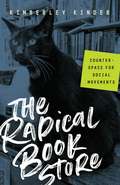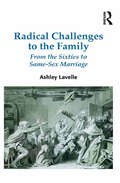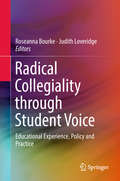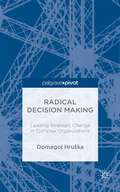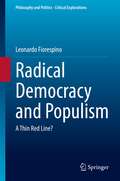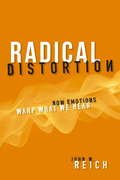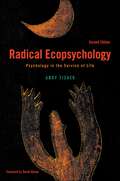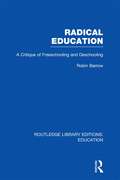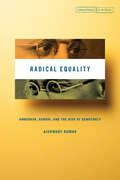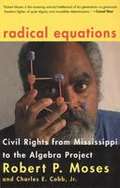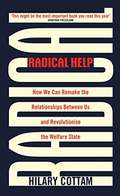- Table View
- List View
Racism in Danish Welfare Work with Refugees: Troubled by Difference, Docility and Dignity (Routledge Research in Race and Ethnicity)
by Marta Padovan-Özdemir Trine ØlandThis book explores contemporary Danish relations of colonial complicity in welfare work with newly arrived refugees (1978-2016) as recursive histories that reveal new shapes and shades of racism. Focussing on super- and subordination in helping relations of postcoloniality, the book displays the durability of coloniality and the workings of raceless racism in welfare work with refugees. Its main contribution is the excavation of stock stories of colour-blindness, potentialising and compassion, which help welfare workers invest in burying that which keeps haunting welfare work with refugees, i.e., modern ghosts of difference, docility and dignity. The book dismantles the global myth of the Danish benevolent, universalistic welfare state and it is of interest to every scholar and student, who wants to make inquiries about Danish exceptionalism and the hidden interaction between past and present, the visible and invisible in Danish welfare work with refugees.
Racism In Europe: The Challenge For Youth Policy And Youth Work
by Jan Laurens HazekampThis accessible text provides a comparative perspective on racism in Europe as experienced and exhibited by young people. It offers a clear analysis of the causes of racism and nationalism and examines public policies designed to have a positive effect.; This book is intended as a supplementary text for undergraduate and postgraduate students in social work, social policy, sociology and political science, and as an essential text for students on professional courses in youth and community work.
Racism in the 21st Century
by Ronald E. HallIn the post-Civil Rights era, there is a temptation to assume that racism is no longer the pressing social concern in the United States that it once was. The contributors show that racism has not fallen from the forefront of American society, but is manifest in a different way. According to the authors in this volume, in 21st century, skin color has come to replace race as an important cause of discrimination. This is evidenced in the increasing usage of the term "people of color" to encompass people of a variety of racial and ethnic backgrounds. The editor has compiled a diverse group of contributors to examine racism from an interdisciplinary perspective. Contributions range from the science of racism, from its perceived biological basis at the end of the 19th century, to sociological studies its new forms in the 21st century. The result is a work that will be invaluable to understanding the challenges of confronting Racism in the 21st Century.
Racism in the Neoliberal Era: A Meta History of Elite White Power (New Critical Viewpoints on Society)
by Randolph Hohle<p>Racism in the Neoliberal Era explains how simple racial binaries like black/white are no longer sufficient to explain the persistence of racism, capitalism, and elite white power. The neoliberal era features the largest black middle class in US history and extreme racial marginalization. Hohle focuses on how the origins and expansion of neoliberalism depended on language or semiotic assemblage of white-private and black public. <p>The language of neoliberalism explains how the white racial frame operates like a web of racial meanings that connect social groups with economic policy, geography, and police brutality. When America was racially segregated, elites consented to political pressure to develop and fund white-public institutions. The black civil rights movement eliminated legal barriers that prevented racial integration. In response to black civic inclusion, elite whites used a language of white-private/black-public to deregulate the Voting Rights Act and banking. They privatized neighborhoods, schools, and social welfare, creating markets around poverty. They oversaw the mass incarceration and systemic police brutality against people of color. Citizenship was recast as a privilege instead of a right. Neoliberalism is the result of the latest elite white strategy to maintain political and economic power.</p>
Racism, Sexism, Power and Ideology (Critical Studies in Racism and Migration)
by Colette GuillauminFirst Published in 2004. Routledge is an imprint of Taylor & Francis, an informa company.
Racism, the City and the State
by Malcolm Cross Michael KeithDoes the concept of ethnicity divide the oppressed or unite minorities? Is the term `community' a dangerous fiction? What are the relations between the liberal capitalist democratic state and racialized minority groups? The contributors to this book confront and discuss these questions, bringing together ideas on urban social theory, contemporary cultural change and analysis of racial surbordination in order to explore the relationship between racism, the city and the state. The book concentrates on the urban context of the process of racialization, demonstrating that the city provides the institutional framework for racial segregation, a key process whereby racialization has been reproduced and sustained. Individual chapters explore the profound divisions inscribed on the face of the city, showing for example that ethnicity is more powerful than social class in moulding the identities of new migrants to California, and that the reconstruction of French capitalism has opened new opportunities for the growth of right-wing popularism. The contributors show how, in the UK, urban space over the last two decades has been redefined and reconstructed in ways which sustain separation and racial inequality, and they highlight how black minorities struggling for survival in Britain's cities are seen as responsible for violence, crime, poverty and overcrowding.
Racism, Violence, Betrayals and New Imaginaries: Feminist Voices
by Nadia Sanger Benita MoolmanThis anthology consists of academic essays, creative non-fiction, poetry and short stories on race and racism by black women from South Africa and Brazil. Through these different genres, the book engages with the complexities of race in social, political, economic, institutional and personal spaces. Concerned with social justice, human rights and freedom, these writings spotlight the amalgamation of racial, gender and class subjectivities and how these are marked, un-marked, re-marked and re-made on bodies. The book connects globally and locally to social and political phenomena in the modern-day world. The contributors interrogate their political and personal worlds, revealing layered, intersecting ways of being that were essentially centred by colonial histories but not defined in totality by coloniality and oppression. In speaking to the proximity of these experiences, they reflect and narrate the past, contemplate the present and imagine the future. This curated anthology asks questions centred around freedom. What does freedom mean? When do we have it, and when do we not? Most importantly, how do we get it? Print edition not for sale in Sub Saharan Africa.
Racist America: Roots, Current Realities, and Future Reparations
by Joe R. Feagin Kimberley DuceyThis fourth edition of Racist America is significantly revised and updated, with an eye toward racism issues arising regularly in our contemporary era. This edition incorporates many recent research studies and reports on U.S. racial issues that update and enhance the last edition’s chapters. It expands the discussion and data on social science concepts such as intersectionality and gendered racism, as well as the concepts of the white racial frame, systemic racism, and the elite-white-male dominance system from research studies by Joe Feagin and his colleagues. The authors have further polished the book and added more examples, anecdotes, and narratives about contemporary racism to make it yet more readable for undergraduates. Student objectives, summaries, key terms, and study questions are available under the e-Resources tab at www.routledge.com/9781138096042.
Racist Violence and the State: A comparative Analysis of Britain, France and the Netherlands
by Rob WitteRacist Violence and the State is the first serious study to apply a comparative research-based approach to the study of racist violence in Britain, France and The Netherlands since 1945. Setting racist violence within a historical background of the post-imperialist legacy, the author presents an accessible, fascinating and highly original analysis of the development of public and state attitudes to racist violence over the past 50 years.
Radiating Feminism: Resilience Practices to Transform our Inner and Outer Lives
by Beth BerilaRadiating Feminism: Resilience Practices to Transform Our Inner and Outer Lives is a practical guide to embodying feminist principles not just in our politics, but also in our very ways of being. Bringing together intersectional feminism with mindful reflection and embodied practice, this book offers practical wisdom for living by feminist principles in our daily lives. Each chapter includes practices and interactive activities to help navigate common challenges along feminist journeys. The book also draws on wisdom from feminist leaders and contemporary conversations from social justice movements. Both inspiring and guiding, the book will provide readers with the skills to cultivate resilience to face the many barriers to feminist social transformation. Radiating Feminism will be of use to students of Gender Studies, Social Work, Psychology, Community Health, and the Social Sciences, as well as anyone with a longstanding or fresh commitment to feminism and social justice.
Radiation and Health
by Leo KuperThe English philosopher Jeremy Bentham first defined the term "mesology," and its related "social mesology," as being the discipline concerned with the effects upon human beings, as individuals or in society, of meteorological conditions, food and drink, urbanization, sanitation, occupation, domesticity, religion, institutions, laws, and psychological factors. In Radiation and Health, originally published in 1964, William Valentine Mayneord takes this argument one step further by adding "ionizing radiation" to this formidable catalogue. While many people argue that health is a definable and measurable quantity, characteristically expressing it in a negative way via mortality or morbidity statistics, Mayneord argues that the patterns of life throughout the world vary so greatly that no standard can be set for all people, or even for the same people at different times. Moreover, health status has to be looked at from a community, as well as from a personal, point of view, and social well-being may be regarded as a predisposing condition of individual health. In the search for quantitative criteria, many "health indicators" have been classified into three groups: those associated with the health status of persons or populations in a given area, those related to physical environmental conditions having a more or less direct bearing on the health status of the population in an area, and those concerned with health-service activities directed to improvement of health conditions. While radiation has many negative effects, it also has positive ones, including curing diseases. Mayneord acknowledges the dangers of radiation, but believes they are manageable if handled responsibly. This classic volume, long unavailable, is much cited in contemporary research on the subject.
Radiation Monitoring and Dose Estimation of the Fukushima Nuclear Accident
by Sentaro TakahashiThis book provides comprehensive research findings related to the environmental monitoring of radiation, levels of radioactive nuclides in various environments and dose estimation in residents after the Fukushima nuclear power plant accident caused severe environmental contamination with radioactive nuclides. At the beginning of the book, a technical review written by a leading researcher of nuclear reactor technology explains what happened at the power plant. The review is followed by a commentary from a former member of the International Commission on Radiological Protection, providing the reader with easily understandable information about the concept of radiation dosage. In the main part of the book, a series of scientific reports presents valuable data on the radiation surveys of the environment, environmental radioactivity, transfer models and parameters of radioactive nuclides and dose assessment among residents. These reports present a wide range of findings from the research carried out in a variety of activities by large governmental organizations as well as by small private groups and individuals. The reader thus will find a large collection of valuable and interesting data related to the environmental contamination by radioactive nuclides after the Fukushima accident. Although earlier reports on this issue have been made public, this book is the only publication to fully depict the actual situation by providing comprehensive data obtained by diverse organizations and individuals.
Radical Belonging: How to Survive and Thrive in an Unjust World (While Transforming it for the Better)
by Lindo Bacon"Belonging has been a formative struggle for me. Like most people with marginalized identities, my experience has taught me that it's hard to be yourself and feel like you belong in a culture that is hostile to your existence. That's why my body of work as a scientist, author, professor, speaker, and advocate for body liberation always comes back to the impact of belonging or not belonging. Radical Belonging is my manifesto, helping us heal from the individual and collective trauma of injustice and support our transition from a culture of othering to one of belonging." —Lindo Bacon Too many of us feel alienated from our bodies. This isn't your personal failing; it means that our culture is failing you. We are in the midst of a cultural moment. #MeToo. #BlackLivesMatter. #TransIsBeautiful. #AbleismExists. #EffYourBeautyStandards. Those of us who don't fit into the "mythical norm" (white, male, cisgender, able-bodied, slender, Christian, etc.)—which is to say, most of us—are demanding our basic right: To know that who we are matters. To belong. Being "othered" and the body shame it spurs is not "just" a feeling. Being erased and devalued impacts our ability to regulate our emotions, our relationships with others, our health and longevity, our finances, our ability to realize dreams, and whether we will be accepted, loved, or even safe. Radical Belonging is not a simple self-love treatise. Focusing only on self-love ignores the important fact that we have negative experiences because our culture has targeted certain bodies and people for abuse or alienation. For marginalized people, a focus on self-love can be a spoonful of sugar that makes the oppression go down. This groundbreaking book goes further, helping us to manage the challenges that stem from oppression and moving beyond self-love and into belonging. With Lindo Bacon's signature blend of science and storytelling, Radical Belonging addresses the political, sociological, psychological and biological underpinnings of your experiences, helping you understand that the alienation and pain you are experiencing is not personal, but human. The problem is in injustice, not you as an individual. So many of us feel wounded by a culture that has alienated us from our bodies and divided us from each other. Radical Belonging provides strategies to reckon with the trauma of injustice; reclaim yourself, body and soul; and rewire your nervous system to better cope within an unjust world. It also provides strategies to help us all provide refuge for one another and create a culture of equity and empathy, one that respects, includes, and benefits from all its diverse peoples. Whether you are transgender, queer, Black, Indigenous or a Person of Color, disabled, old, or fat—or your more closely resemble the "mythical norm"—Radical Belonging is your guidebook for creating a world where all bodies are valued and all of us belong—and for coping with this one, until we make that new world a reality.
The Radical Bookstore: Counterspace for Social Movements
by Kimberley KinderExamines how radical bookstores and similar spaces serve as launching pads for social movements How does social change happen? It requires an identified problem, an impassioned and committed group, a catalyst, and a plan. In this deeply researched consideration of seventy-seven stores and establishments, Kimberley Kinder argues that activists also need autonomous space for organizing, and that these spaces are made, not found. She explores the remarkably enduring presence of radical bookstores in America and how they provide infrastructure for organizing—gathering places, retail offerings that draw new people into what she calls &“counterspaces.&”Kinder focuses on brick-and-mortar venues where owners approach their businesses primarily as social movement tools. These may be bookstores, infoshops, libraries, knowledge cafes, community centers, publishing collectives, thrift stores, or art installations. They are run by activist-entrepreneurs who create centers for organizing and selling books to pay the rent. These spaces allow radical and contentious ideas to be explored and percolate through to actual social movements, and serve as crucibles for activists to challenge capitalism, imperialism, white privilege, patriarchy, and homophobia. They also exist within a central paradox: participating in the marketplace creates tensions, contradictions, and shortfalls. Activist retail does not end capitalism; collective ownership does not enable a retreat from civic requirements like zoning; and donations, no matter how generous, do not offset the enormous power of corporations and governments. In this timely and relevant book, Kinder presents a necessary, novel, and apt analysis of the role these retail spaces play in radical organizing, one that demonstrates how such durable hubs manage to persist, often for decades, between the spikes of public protest.
Radical Challenges to the Family: From the Sixties to Same-Sex Marriage
by Ashley LavelleDefending the nuclear family and extolling ’family values’ have long been central features of politics in capitalist societies, in spite of radical left challenges from social, counter-cultural and gay rights movements. This book examines these challenges as they emerged in the 1960s and 1970s, re-appraising their relevance in the light of recent developments, including the spread of more diverse family forms and the rise of the same-sex marriage movement. Drawing on archival research in the US, UK and Australia, the author asks what the emergence of same-sex marriage movements and legislation mean for challenges to the nuclear family in the light of an original general hostility to marriage and family structures in the gay liberation movement, whilst considering the extent to which the nuclear family might be included in the list of social and economic institutions subject to criticism on the part of more recent anti-capitalist movements, such as Occupy. A detailed study of the extent to which the nuclear family remains susceptible to the radical critiques of the last century, Radical Challenges to the Family examines whether the original challenges shed light on ensuring social problems, including domestic violence, child abuse, homophobia, and growing marital dissatisfaction. As such, it will appeal to scholars of sociology and politics with interests in gender and sexuality, the sociology of the family and feminist thought.
Radical Collegiality through Student Voice: Educational Experience, Policy and Practice
by Roseanna Bourke Judith LoveridgeThis book celebrates the rights of the child, through including student voice in educational matters that affect them directly. It focuses on the experiences of children and young people and explores how our educational policies, practices and research endeavours enable educators to help young people tell their own stories. The respective chapters illustrate how listening to young people can help them attain new positions of power, even though doing so often creates discomfort and requires a radical change on the part of the adult establishment. Further, the book challenges researchers, teachers and practitioners to reconsider how students are involved in research and policy agendas, and to what extent radical collegiality can create fundamental and positive changes in the lives of these learners. In recent decades, greater attention has been paid across policy, practice and research discourses to involving children more meaningfully and actively in decisions about their participation in both formal and informal educational settings. The book’s goal is to illustrate how researchers have systematically involved students in the pursuit of a richer understanding of educational experiences, policy and practice through the eyes and ears of young people, and through their own cultural lens.
Radical Decision Making: Leading Strategic Change in Complex Organizations
by Domagoj HruškaRadical Decision Making offers a controversial new framework to the conventional strategic change management conversation. While many approaches provide a discussion on a singular level, Dr. Hru ka blends theory and research of decision making and social interaction to develop a consistent framework of strategic change. "
Radical Democracy and Populism: A Thin Red Line? (Philosophy and Politics - Critical Explorations #18)
by Leonardo FiorespinoThis book offers an extensive comparative analysis of populism and radical democratic theories, tracing the line dividing the respective conceptions of ‘people’ and ‘popular sovereignty’. Whereas populism is often said to intertwine with democracy in some way, the contention of this book is that it significantly departs from democratic theory and practice, and belongs to a distinct conceptual space. It cannot be made to overlap, for instance, with “illiberal democracy”, the “democratic myth”, a crude electoral majoritarianism, nor can it amount to hiding undemocratic policies into properly democratic justifications. These positions, frequent as they are in the literature, are contested on the grounds of the dividing line identified, which starts unfolding at the level of the conception of ‘the people’ – i.e., of the sovereign – presupposed by populists and democrats. This book is of great interest to scholars involved in the study of democratic theory, contemporary challenges to democracy and the recent upsurge of populist discourse, as it helps better understand populism as a political phenomenon and more adequately defines it as a self-standing concept in political theory.
Radical Distortion
by John W. ReichAn insightful discussion of the social-science research on the decision-making processes to help us overcome the biases that divide us. Our social unity is under attack from extremists on opposite sides of the political spectrum. Often the loudest and most influential public voices today are also the most divisive. Amid the din of conflicting claims, accusations, and counteraccusations, voices of moderation can no longer be heard. Radical speech is creating hazards for civil discourse and even for governance. Under such conditions, how will we ever find common ground to advance the needs of the nation? This psychologist presents answers to this question in this insightful discussion of the social-science research on the decision-making processes of those who endorse extremist beliefs. A key finding of this research is that extremism causes selective hearing and biases our very ability to form objective judgments. In fact, radical speech leads to radical hearing and impedes our willingness to consider moderate viewpoints.Based on these findings, Reich presents seven principles whereby we can reduce or eliminate the toxic influences of extremist rhetoric and selective hearing. These include becoming aware of how emotion affects our judgments, accepting the fact that we live in a diverse society where differing points of view are common, and detecting when extremist rhetoric is designed solely to attack its opponents. If knowledge is power, then the best antidote to toxic speech is increased scientific understanding of how our judgments are formed. By making the latest social-science research on this important subject accessible, Radical Distortion takes a crucial first step toward creating a more civil society.
Radical Ecopsychology, Second Edition: Psychology in the Service of Life (SUNY series in Radical Social and Political Theory)
by Andy FisherPersonal in its style yet radical in its vision, Radical Ecopsychology, Second Edition offers an original introduction to ecopsychology—an emerging field that ties the human mind to the natural world. In order for ecopsychology to be a force for social change, Andy Fisher insists it must become a more comprehensive and critical undertaking. Drawing masterfully from humanistic psychology, hermeneutics, phenomenology, radical ecology, nature writing, and critical theory, he develops a compelling account of how the human psyche still belongs to nature. This daring and innovative book proposes a psychology that will serve all life, providing a solid base not only for ecopsychological practice, but also for a critical theory of modern society. In this second edition, Fisher includes a new preface, a new section looking back at the development of the field since the book's initial publication a decade ago, and a look at the challenges that lie ahead.
Radical Education: A Critique of Freeschooling and Deschooling (Routledge Library Editions: Education)
by Robin BarrowThis volume is a comprehensive critique of the radical tradition in educational theory. It traces the development of the key ideas in radical literature from Rousseau to the present day. Two opening chapters set Rousseau’s educational views and arguments in their political perspective, and subject them to an extended critical treatment. Subsequent chapters provide detailed analyses and examination of the ideas of A S Neill, Paul Goodman, Ivan Illich and Everett Reimer, Charles Weingartner and Neil Postman. Each author is treated separately but certain common themes and ideas are extracted and considered without reference to any particular author. Amongst others, the concepts of nature, learning, hidden curriculum and the relativity of knowledge are examined; at the same time broader arguments about the degree and nature of freedom that should be provided to children, deschooling and assessment are pursued.
Radical Equality: Ambedkar, Gandhi, and the Risk of Democracy
by Aishwary KumarB. R. Ambedkar, the architect of India's constitution, and M. K. Gandhi, the Indian nationalist, two figures whose thought and legacies have most strongly shaped the contours of Indian democracy, are typically considered antagonists who held irreconcilable views on empire, politics, and society. As such, they are rarely studied together. This book reassesses their complex relationship, focusing on their shared commitment to equality and justice, which for them was inseparable from anticolonial struggles for sovereignty. Both men inherited the concept of equality from Western humanism, but their ideas mark a radical turn in humanist conceptions of politics. This study recovers the philosophical foundations of their thought in Indian and Western traditions, religious and secular alike. Attending to moments of difficulty in their conceptions of justice and their language of nonviolence, it probes the nature of risk that radical democracy's desire for inclusion opens within modern political thought. In excavating Ambedkar and Gandhi's intellectual kinship, Radical Equality allows them to shed light on each other, even as it places them within a global constellation of moral and political visions. The story of their struggle against inequality, violence, and empire thus transcends national boundaries and unfolds within a universal history of citizenship and dissent.
Radical Equations: Civil Rights from Mississippi to the Algebra Project
by Robert Moses Charles E. CobbAt a time when popular solutions to the educational plight of poor children of color are imposed from the outside—national standards, high-stakes tests, charismatic individual saviors—the acclaimed Algebra Project and its founder, Robert Moses, offer a vision of school reform based in the power of communities. Begun in 1982, the Algebra Project is transforming math education in twenty-five cities. Founded on the belief that math-science literacy is a prerequisite for full citizenship in society, the Project works with entire communities—parents, teachers, and especially students—to create a culture of literacy around algebra, a crucial stepping-stone to college math and opportunity. This book provides a model for anyone looking for a community-based solution to the problems of our disadvantaged schools.
Radical Help: How we can remake the relationships between us and revolutionise the welfare state
by Hilary CottamHow should we live: how should we care for one another; grow our capabilities to work, to learn, to love and fully realise our potential? This exciting and ambitious book shows how we can re-design the welfare state for this century. The welfare state was revolutionary: it lifted thousands out of poverty, provided decent homes, good education and security. But it is out of kilter now: an elaborate and expensive system of managing needs and risks. Today we face new challenges. Our resources have changed. Hilary Cottam takes us through five 'Experiments' to show us a new design. We start on a Swindon housing estate where families who have spent years revolving within our current welfare systems are supported to design their own way out. We spend time with young people who are helped to make new connections - with radical results. We turn to the question of good health care and then to the world of work and see what happens when people are given different tools to make change. Then we see those over sixty design a new and affordable system of support. At the heart of this way of working is human connection. Upending the current crisis of managing scarcity, we see instead that our capacities for the relationships that can make the changes are abundant. We must work with individuals, families and communities to grow the core capabilities we all need to flourish. Radical Help describes the principles behind the approach, the design process that makes the work possible and the challenges of transition. It is bold - and above all, practical. It is not a book of dreams. It is about concrete new ways of organising that already have been developing across Britain. Radical Help creates a new vision and a radically different approach that can take care of us once more, from cradle to grave.
Radical Help: How we can remake the relationships between us and revolutionise the welfare state
by Hilary CottamHow should we live: how should we care for one another; grow our capabilities to work, to learn, to love and fully realise our potential? This exciting and ambitious book shows how we can re-design the welfare state for this century. The welfare state was revolutionary: it lifted thousands out of poverty, provided decent homes, good education and security. But it is out of kilter now: an elaborate and expensive system of managing needs and risks. Today we face new challenges. Our resources have changed. Hilary Cottam takes us through five 'Experiments' to show us a new design. We start on a Swindon housing estate where families who have spent years revolving within our current welfare systems are supported to design their own way out. We spend time with young people who are helped to make new connections - with radical results. We turn to the question of good health care and then to the world of work and see what happens when people are given different tools to make change. Then we see those over sixty design a new and affordable system of support. At the heart of this way of working is human connection. Upending the current crisis of managing scarcity, we see instead that our capacities for the relationships that can make the changes are abundant. We must work with individuals, families and communities to grow the core capabilities we all need to flourish. Radical Help describes the principles behind the approach, the design process that makes the work possible and the challenges of transition. It is bold - and above all, practical. It is not a book of dreams. It is about concrete new ways of organising that already have been developing across Britain. Radical Help creates a new vision and a radically different approach that can take care of us once more, from cradle to grave.
